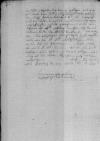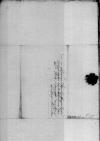Wir habenn jestrigs thages gen den abendt E(wer) Er(barkei)t ⌊⌋ mit den copeyen entpfangen, / uberlesen und der meynung wol eingenhomen(n), / nemlich in dem, dorynnen E(wer) Er(barkei)t unsern rath begerenn, / der bey uns klein. / Und wan ein ding geschenn yst, / wy im sprichwort / benhomen wirt, / das mugen wir samptlich unser unsteten eynikeytt, / und den, dy sy erweckt, dancken etc. Wir besorgen uns, (: welchs wir vortrawther weys E(wer) Er(barkei)t wy unsers ⌊vatherlands⌋ vorwanthenn(n) an tzutzeygen nicht haben mocht nachlassenn :) das die gestaldt dyser umbkreis dyses vortzeythen wol erbawthen ⌊orts⌋ / einfhal ader grosse wandlung wirdt leyden, / zu solcher zceit uns Gott io nicht wolde lassen lebenn etc. Das wir dennoch, so vyl noch rats bey uns yst, / E(wer) Er(barkei)t mochten mytteylenn(n), befind wir nichts fueglichers, / dan das E(wer) Er(barkei)t, / dyweyl solchs andre stende und wir auch gethan, / ko(nigliche)n wyllenn(n) volgtenn, / und von allem antwurt / uff solchen schrifften befellich / abs illegible⌈[abs]abs illegible⌉tunden, / uns uff unser zu samen(n) komen, / das noch wenig thagenn vor sthet, / als den mag mit reyfferem rathe was thauffers vorgenhomen werdenn etc.
Wir haben negst dem hochwirdigen ⌊her von Colmeshe⌋ ⌊⌋ auß unser beredung, / dy wir negst hie mit dem wolgebornen herrn ⌊dantzker castellann⌋ gehalthenn, / das, so es zu ⌊Marienburg⌋ uffm slosse und in der stadt vorgyfftiger lufft halben / unsicher ist, / auch das illegible⌈[as]as illegible⌉ sich  APG 300, 53, 267 p. 32 der stelle enthalden dy, / den sy befolhen, / und uns im lande kein andre antzusetzen wyl geburen, / das solche sterbens ferlicheit ⌊ko(nigliche)r m(ajeste)t⌋ angetzeigt, / und ein ander, / do gesunt wesen wer(e), / acht thage noch pfingsten[1] wurde gebethenn(n). / So dis vornhemen E(wer) Er(barkei)t gefellig, / mochten sich des mit andrenn stenden schrifftlich bereden etc. Dy cantzley, / der gelegenheit wie zu dyser zceyt wyssen, wolle wir bey E(wer) Er(barkei)t entschuldigen, / dan es sein dy sy regiren etc.
APG 300, 53, 267 p. 32 der stelle enthalden dy, / den sy befolhen, / und uns im lande kein andre antzusetzen wyl geburen, / das solche sterbens ferlicheit ⌊ko(nigliche)r m(ajeste)t⌋ angetzeigt, / und ein ander, / do gesunt wesen wer(e), / acht thage noch pfingsten[1] wurde gebethenn(n). / So dis vornhemen E(wer) Er(barkei)t gefellig, / mochten sich des mit andrenn stenden schrifftlich bereden etc. Dy cantzley, / der gelegenheit wie zu dyser zceyt wyssen, wolle wir bey E(wer) Er(barkei)t entschuldigen, / dan es sein dy sy regiren etc.
Dyß alleß hab wir so E(wer) Er(barkei)t, dy wir Got in sein gnad befolhenn, / zum bestenn in trewer guther meynung uff der selbten schreybenn nicht mugen vorhalthenn. /
 APG 300, 53, 267 p. 32 der stelle enthalden dy, / den sy befolhen, / und uns im lande kein andre antzusetzen wyl geburen, / das solche sterbens ferlicheit
APG 300, 53, 267 p. 32 der stelle enthalden dy, / den sy befolhen, / und uns im lande kein andre antzusetzen wyl geburen, / das solche sterbens ferlicheit 

